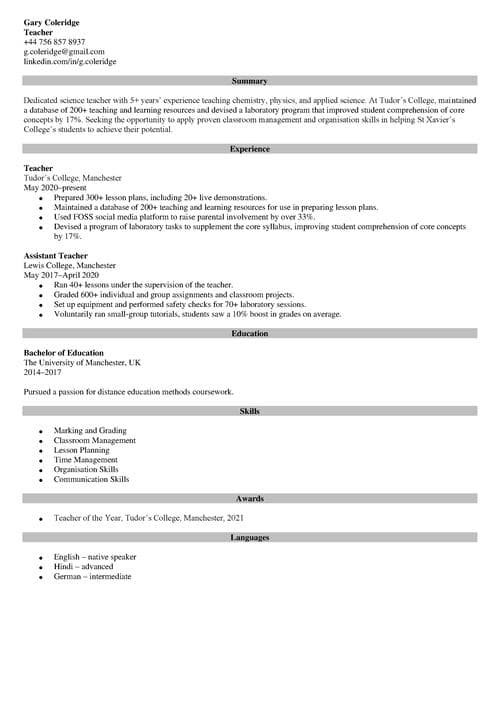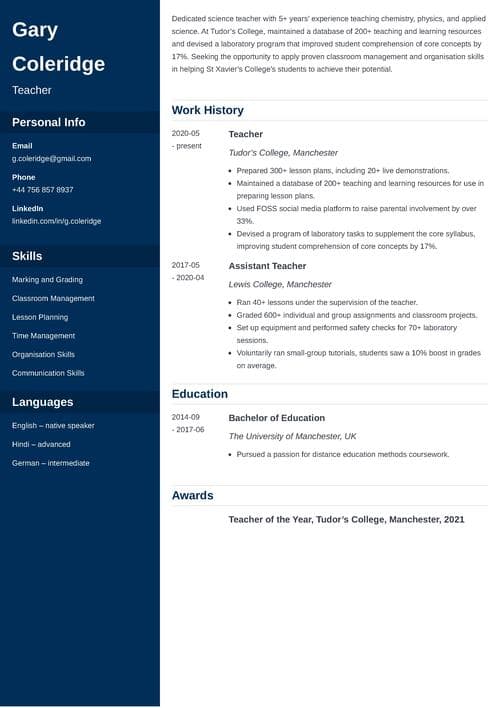Europass CV Format: Should You Use It? Pros & Cons
Create your CV nowLooking to work or study in Europe? The Europass CV is a standardised tool designed to help you showcase your qualifications across borders. With the CV Europass format, employers can easily compare applications, no matter where you're from.
In this guide, you'll learn how to make a Europass CV online, use the Europass CV editor, and choose the right Europass CV template. Plus, we’ll explore when to use it – and when a different format might give you a competitive edge.
This guide will show you:
- A professional CV example better than 9 out of 10 Europass CVs out there.
- How to make a Europass CV online, and why you might want to try something else.
- Tips and examples of how to put skills and achievements in a Europass CV.
- How to describe your experience on a CV to get any job you want.
Want to save time and have your CV ready in 5 minutes? Try our CV builder. It’s fast and easy to use. Plus, you’ll get ready-made content to add with one click. See 20+ CV templates and create your CV here.
Sample CV made with our builder—See more templates and create your CV here.
What is a Europass CV?
A Europass CV is a standardised CV format created by the European Union. Its purpose is to help individuals across Europe present their qualifications, skills, and experiences in a consistent and easily understood way. It is designed to streamline the job application process, so employers can easily compare candidates from different countries. The EU launched the Europass framework in 2005 in response to the confusion caused by varying national CV formats and qualifications.
It’s worth noting that Europass CV is just one component of a broader, integrated digital platform called Europass. This platform offers a suite of tools and documents designed to enhance the job or study application process, such as:
- Europass Profile: An online digital profile where you can store and manage all your skills, qualifications, and experiences in one place, making it easier to update and share your credentials.
- Cover Letter Builder: A tool to help you write cover letters to complement your Europass curriculum vitae.
- Mobility Document: Records and validates skills gained during learning or work experiences abroad, helping highlight international mobility and cultural adaptability.
- Certificate Supplement: Provides additional details about vocational or professional certificates, clarifying qualifications for employers unfamiliar with national education systems.
- Diploma Supplement: Offers detailed information on academic degrees, ensuring that diplomas are understood across different countries and educational contexts.
These components together form a comprehensive ecosystem that supports candidates in presenting a complete, verified, and standardised professional profile.
💡 Make sure that your CV ticks all the boxes. Check here: CV Structure That’s Perfect
Expert-curated video content
If you prefer watching, our Certified Professional CV Writer, Caio, will explain in detail everything about the Europass CV!
Should you use a Europass CV?
The Europass CV is widely recognised across EU institutions, universities, and public sector employers. But it's important to know:
- It’s ideal for EU internships, Erasmus+ programs, or roles in government and education sectors. In fact, most of the users of the Europass CV editor are under the age of 30.
- It’s not recommended for most roles in the UK private sector or highly competitive industries, where a modern CV format is expected.
If you're applying only within the UK, the Europass CV might even work against you. In my opinion, the main problem is that the Europass template doesn’t give complete guidance for all the CV sections, and some of the guidance it does give is incomplete.
💡 Pro tip: Use the Europass CV when you have to—but build a modern, UK-optimised CV if you want to truly stand out and get shortlisted faster.
How to make a Europass CV
Creating a document in the Europass CV editor is a relatively simple process. All you have to do is follow these steps:
- Go to the Europass CV online creator.
- Register on the site and create a profile to save your information for later use, and access all available tools.
- Fill in each section and click “save” when you’re done.
Here are some other Europass CV tips you might find helpful:
- If anything is unclear, try clicking on the blue “i” information icons.
- Click on the blue “+” icons to add more entries to a section.
- At a minimum, add an about me, work experience, education, and at least one skills section to your Europass CV.
- Aim to add two or three additional sections after these.
Once you’re done, choose one of the four Europass CV templates. On the left of the screen, you can turn off the Europass CV logo (I recommend that you do). You can also select an accent colour and set the text size. Choose the largest text size that doesn’t extend your CV length by an additional page.
💡 Learn more about making a great CV: 10+ Things That Make a CV Good
Europass CV: pros and cons
The Europass CV format often divides opinion, and for good reason. It’s a standardised format backed by the European Commission, but it’s also widely criticised for being outdated and too rigid. Let's break down the real pros and cons, especially from a UK job market perspective.
✅ Europass CV: advantages
Benefit | Why It Matters |
Free and easy to use | The CV builder is completely free and beginner-friendly – perfect if you’re just getting started. |
Accepted across the EU | Especially useful when applying to institutions, universities, and public sector employers in EU countries. |
Integrated ecosystem | Works seamlessly with other Europass tools: Cover Letter builder, Europass Profile, Diploma Supplement, and Certificate Supplement. |
Available in 31 languages | Great for job seekers applying in multilingual environments. |
Supports EQF-level comparison | Enables the EU employers to understand UK qualifications more easily via the European Qualifications Framework. |
Auto-fill from your Profile | Once you’ve built a Europass Profile, you can generate multiple tailored CVs quickly. |
Translatable CV | Your CV can be easily translated into any supported EU language – ideal for cross-border applications. |
❌ Europass CV: disadvantages
Drawback | Why It’s a Problem |
Outdated look and rigid formatting | Compared to modern CVs, Europass feels bulky and unpolished. It limits how much you can personalise or structure your content. |
Wastes space | The layout spreads text across multiple lines and sections, making it harder to fit significant achievements into the desired CV length. |
Looks like everyone else's | It's such a common format that recruiters may not notice your CV – making it hard to stand out. |
Not ATS-friendly outside the EU | Some applicant tracking systems (ATS) may struggle with the Europass CV format. |
Not suitable for creative or competitive industries | If you’re in marketing, design, media, or tech, you’ll likely be expected to use a more impactful, customised format. |
Limited relevance in the UK | Most UK employers prefer modern, concise CVs tailored to the job – Europass CV examples don’t always meet that standard. |
UK-centric reality check on the Europass CV format
While the Europass CV serves a clear purpose for cross-border applications, its limitations are even more evident in the UK hiring landscape:
- British recruiters expect tailored CVs with clean formatting, bullet points, and a strong personal statement – not rigid templates.
- In private sector roles, using a Europass CV sample might actually hurt your chances by making you seem generic or unpolished.
- Academic and public sector jobs in the EU are the best fit – but even there, you should still supplement the Europass CV with a strong cover letter and clear evidence of skills.
Bottom line? The Europass CV is a decent tool – but it shouldn’t be your only tool. If you want to actually win interviews (not just meet basic criteria), your CV needs to look modern, speak the recruiter’s language, and highlight your unique value, especially in a competitive market like the UK.
💡 Haven’t seen an excellent CV in a while? Check this guide: What Does a Good CV Look Like Now?
Europass CV format vs professional UK CV format
The Europass CV may be convenient, but when it comes to getting interviews, convenience alone doesn’t cut it.
A truly effective CV must be:
- Tailored to the job
- Visually clean but attention-grabbing
- ATS-compatible
- Designed to highlight results, not just responsibilities
Let’s compare them side by side:
Feature | Europass CV | Professional UK CV |
Format | Standardised, rigid | Flexible, customisable |
Length | Often spills to 2+ pages | Typically 1 page (max 2 for experienced) |
Visual design | Basic, outdated | Modern, clean layout |
ATS-friendliness | Moderate | High (if designed well) |
Best use case | Academic/public sector, EU-wide roles | UK jobs, competitive industries |
Customisability | Limited | High |
Branding/impact | Weak – looks generic | Strong – stands out |
Professional UK CV format example
While the Europass CV offers a standardised approach, there are many areas where it falls short: formatting flexibility, visual appeal, ATS-friendliness, and the ability to make a substantial impact on recruiters. The guidance within the Europass CV creator, though well-intentioned, often results in generic documents that fail to highlight a candidate’s true potential.
Now, let me show you a professional CV example, designed to be personalised, visually polished, and optimised to land interviews:
Gary Coleridge
Teacher
+44 756 857 8937
g.coleridge@email.com
linkedin.com/in/g.coleridge
Summary
Dedicated science teacher with 8+ years’ experience teaching chemistry, physics, and applied science. At Tudor’s College, maintained a database of 200+ teaching and learning resources and devised a laboratory program that improved student comprehension of core concepts by 17%. Seeking the opportunity to apply proven classroom management and organisation skills in helping St Xavier’s College’s students to achieve their potential.
Experience
Teacher
Tudor’s College, Manchester
May 2020–August 2025
Key Qualifications & Responsibilities
- Prepared over 300 engaging lesson plans, including 20+ live science demonstrations.
- Delivered classes in chemistry, physics, and applied science across GCSE and A-Level curricula.
- Maintained a digital database of 200+ teaching and learning resources.
- Integrated technology into lessons, including simulation tools and virtual labs.
- Organised and supervised laboratory sessions, ensuring compliance with safety standards.
- Communicated regularly with parents and guardians via the FOSS platform.
Key Achievements
- Boosted student comprehension of core concepts by 17% through a new lab-based learning initiative.
- Raised parental engagement by 33% through consistent digital communication.
Assistant Teacher
Lewis College, Manchester
May 2017–April 2020
Key Qualifications & Responsibilities
- Conducted over 40 lessons under supervision across science subjects.
- Assisted in lesson planning and adapted materials for diverse learning needs.
- Graded 600+ student assignments and projects with timely feedback.
- Set up and maintained equipment for over 70 science laboratory sessions.
Key Achievements
- Led voluntary small-group tutorials that helped boost average student performance by 10%.
Education
Bachelor of Education
The University of Manchester, UK
2014–2017
Pursued a passion for distance education methods coursework.
Skills
- Marking and Grading: Consistently provided accurate, constructive, and timely feedback on assessments.
- Classroom Management: Maintained discipline and engagement in classes of 25+ students with diverse needs.
- Lesson Planning: Designed lessons aligned with national curriculum, focusing on interactivity and inclusion.
- Time Management: Balanced teaching, planning, grading, and extracurricular involvement efficiently.
- Organisation Skills: Developed resource libraries and classroom systems that enhanced daily operations.
- Communication Skills: Built strong relationships with students, parents, and staff through clear, empathetic dialogue.
Awards
- Teacher of the Year, Tudor’s College, Manchester, 2021
Languages
- English – native speaker
- Hindi – advanced
- German – intermediate
This kind of CV offers a clear, structured way to highlight your strengths – one that feels both professional and personal. With a bit of thoughtful formatting and the right emphasis on achievements, your experience comes across more effectively to employers. It’s a flexible approach that lets you present your value with impact, while still keeping things clean and easy to read.
When making a CV in our builder, drag & drop bullet points, skills, and auto-fill the boring stuff. Spell check? Check. Start building a professional CV template here for free.
When you’re done, Zety’s CV builder will score your CV and tell you exactly how to make it better.
How to make a professional CV
Now, let me break things down into smaller steps. You can build a CV just like the one above – with less effort than you might think.
1. Pick a template that stands out
As I've mentioned before, Europass CV templates are okay – but they’re far from the best. What you want is an easily customisable CV template that enables you to fit a lot of information onto one page and is visually pleasing, as well as standing out in the crowd.
2. Format it correctly
Use 1-inch margins, clear headings, and a legible CV font sized 11–12 points. Stick to reverse-chronological order (most recent experience first). Save your CV as a PDF, and keep a .docx version in case a recruiter requests it.
3. Create a compelling CV profile
Your CV profile is a short intro at the to: 2–4 sentences that highlight your achievements and career focus.
Use this formula:
Adjective + Job title & experience + Key quantified achievements + What you offer the employer
4. Highlight work experience and education
If you’re experienced, list work history first. If you’re writing a recent graduate CV, start with education. Focus on professional achievements, not just tasks. Always include dates and locations for each entry.
5. Add a skills section
Follow work and education with a dedicated skills section. If using a modern template, place it in a sidebar. List up to 10 key skills relevant to the job – draw from the job ad to match what employers want. Use a mix of soft skills (like interpersonal skills) and hard skills (like analytical skills, coding, or equipment use).
6. Pick some additional sections
Show your personality and drive by including a couple of the following:
- Licences and certifications
- Foreign language skills
- Memberships in professional associations
- Projects
- Volunteer work
- Hobbies and interests (but only if they show your work-related skills in some way)
Just make sure only to include things that are relevant to your role and not too far in the past. A Microsoft Office 95 certification won’t be of interest to employers!
💡 Pro tip: Before submitting, pair your CV with a strong cover letter that highlights your top strengths.
Plus, a great cover letter that matches your CV will give you an advantage over other candidates. You can write it in our cover letter builder here. Here's what it may look like:
See more cover letter templates and start writing.
Would you like to learn more about writing a job-winning CV? Read our guides:
- 20+ Job Winning CV Tips and Advice
- Skills-Based CV Format
- How to Write a CV Personal Statement
- Differences Between a CV and a Resume
- Student CV Example & Template
- Internship CV Example & Template
- Graduate CV Example & Template
Key takeaways
Let me sum up how to make a Europass CV and why you might want to choose a different CV format:
- Create a profile on the Europass website.
- Work through the Europass CV maker, clicking on the blue information icon when needed.
- Fill in your contact details and add about me, work experience, education and training, and skills sections. Add up to three more sections, including a languages section.
- Choose a template, and you’re done.
- Or try the Zety CV builder instead for a much more attention-grabbing CV with more modern templates to choose from.
Thanks for reading my article on how to create a Europass CV. If you’d like to find out more about the art of professional CV writing, head over to our blog for more expert tips. Trust me, creating a job-winning masterpiece is much easier than you think!
About Zety’s Editorial Process
This article has been reviewed by our editorial team to make sure it follows Zety's editorial guidelines. We’re committed to sharing our expertise and giving you trustworthy career advice tailored to your needs. High-quality content is what brings over 40 million readers to our site every year. But we don't stop there. Our team conducts original research to understand the job market better, and we pride ourselves on being quoted by top universities and prime media outlets from around the world.







